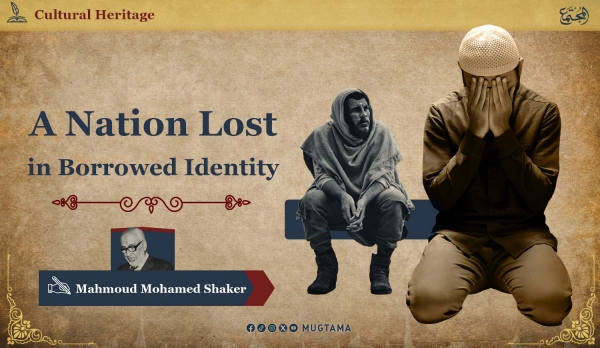I had hardly finished reading what I was able to read today, and the days before, when my mind returned to reflect on the foundations of what I had read from the words of authors and poets. I began to recall the many currents surging beneath their expressions, phrases, meanings, and purposes.
When I first agreed to write this section of Al-Risalah magazine, I thought that my motivation for writing and my long experience with its material would be enough to calm my soul and restrain some of its agitation. But I was mistaken. For most of what I forced myself to read kindles the fire every time it begins to die down, revives it as a fresh blaze every time it fades, and thrusts me into something like a raging inferno of pain, regret, and anger—that the fate and end of Arabic literature should be such weakness, corruption, and ugliness.
The people of this Arabic tongue and those who speak it have suffered, through successive ages, calamities of ignorance, heedlessness, and weakness. The thrones of government in all their lands were shattered, and every aggressor from among the wolves of nations attacked them, subjugated them, took them captive, and tore their limbs apart—sometimes with violence and tyranny, and other times with cunning and deceitful politics.
Then came days that stirred embers from beneath the darkness of night—embers that first scattered and then gathered again, then their sparks flew until they cast some life into every dormant thing. Thus, the dreams of the sleepers were stirred by their illusions, inventions, and artistic expressions, and they rose up seeking to realize the lights of their night visions in the blackness of their days. But they rose and moved without order, planning, or preparation. So the new forces dispersed and were torn apart—they weakened and failed, and nothing of the victory, triumph, or leadership once hoped for them came to pass. Weakness remained the foundation of these Arab nations, and the foundation of their actions, in an age of overwhelming European strength that stretches, expands, and sweeps across the entire earth—pushing forward, pouring forth, neither stopping nor relenting.
Among the calamities of nations that are weak in spirit is that their rush to imitation—imitation of the strong—is far greater than their drive to revive their own history by the means of strength that could inject into their veins the vigor of life. Weakness makes imitation of the strong the very basis of all their actions. So, when the leadership of opinion-makers in these weak nations became corrupt—and since the one who awakens must act—the actions of individuals came scattered and based on two principles: one weakness inherited from the loss of the political entity of the state, and another weakness that afflicted them from the fragmentation of leadership and the scattering of aims. It is no surprise, then, that every action should bear a mark of weakness apparent in the weakness of its doer. And it is no surprise that the greatest of our actions are nothing but imitations of other peoples’ actions—based on desire, ignorance, and confusion that runs without reason.
This is everything before our eyes and in our hands: our homes, our schools, their students, our men, our women, our knowledge, our literature, our art, our morals... all of that, in general and in detail, is marked by the brand of weakness, fragmentation, and the absence of harmony among its parts—those parts from whose sum the meaning of a nation is supposed to be formed. And all of it is imitation, collected from the scattered desires of its practitioners, from here and there.
Imitation by its very nature touches only the surface of things. Therefore, all our borrowings are nothing but appearances. This woman—who is the art of life that always yearns to create, even in harm—you hardly see her among us except as a doll stitched together from civilizations and their oddities... her clothes, her adornments, her jewelry, her makeup, her hair, her manicured fingers, her walk, her speech—all of it is foreign to her, artificial, extracted from the appearances of Parisian courtesans and Hollywood flirts. It has no resemblance or connection to her nature or origins. And the most hideous thing is that it is patchwork, lacking the internal harmony found in the original source from which it was imitated.
And this writer and this poet—both of whom are expressions of life that seek to renew its meanings through influence and eloquence—you will find in most of what they write only dead meanings, forcibly transferred from their original contexts, placed in an atmosphere alien to them, where they suffocate—and what was once alive in their expression dies in the process of transplantation. And so it is, with everything the eye sees or the mind grasps, it is nothing but a fabricated claim, a borrowed imitation, and a calamity among calamities.
We shall remain imitators until the free—who are a scattered, lost minority—can extend their authority over the entirety of social life and restore to the living some of that intense spiritual unrest that drives a living being to independence, self-respect, and the zeal to renew the legacies inherited from his history. Then he will venture into modern civilization with the spirit of a reformer, not with the weakness of an imitator. At that moment, he will extract from civilization the very causes by which civilizations are born and will no longer be in a position of the miserable outcast waiting at the banquet table... waiting, hunger in his eyes, to snatch a few scraps from its leftovers.
-------------------------------------------------------------
Source: Mahmoud Mohammed Shaker’s Collection of Articles
